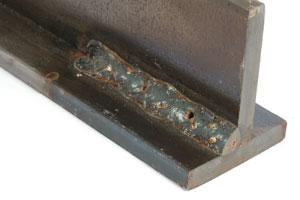Porosity in Welding: Identifying Common Issues and Implementing Best Practices for Avoidance
Porosity in welding is a pervasive problem that commonly goes undetected till it causes significant problems with the stability of welds. In this discussion, we will certainly check out the crucial variables adding to porosity development, analyze its destructive effects on weld performance, and discuss the best practices that can be adopted to reduce porosity incident in welding procedures.
Typical Sources Of Porosity

Utilizing filthy or wet filler materials can present contaminations into the weld, contributing to porosity problems. To reduce these typical reasons of porosity, detailed cleansing of base steels, proper shielding gas selection, and adherence to optimal welding parameters are important practices in achieving top quality, porosity-free welds.
Effect of Porosity on Weld High Quality

The existence of porosity in welding can considerably jeopardize the structural honesty and mechanical buildings of welded joints. Porosity creates gaps within the weld steel, deteriorating its general strength and load-bearing ability. These gaps function as tension concentration factors, making the weld a lot more vulnerable to cracking and failing under applied loads. In addition, porosity can minimize the weld's resistance to rust and various other ecological elements, further lessening its durability and efficiency.
Among the primary repercussions of porosity is a decline in the weld's ductility and durability. Welds with high porosity degrees have a tendency to show lower effect strength and decreased capacity to deform plastically prior to fracturing. This can be specifically concerning in applications where the bonded parts go through vibrant or cyclic loading problems. Additionally, porosity can restrain the weld's ability to successfully send forces, resulting in early weld failing and potential security threats in critical structures.
Best Practices for Porosity Prevention
To enhance the structural honesty and top quality of bonded joints, what details actions can be applied to decrease the event of porosity throughout the welding process? Porosity prevention in welding is essential to ensure the integrity and toughness of the last weld. One efficient method is proper cleaning of the base steel, getting rid of any type of contaminants such as rust, oil, paint, or dampness that might result in gas entrapment. Guaranteeing that the welding equipment remains in great condition, with tidy consumables and proper gas flow prices, can additionally considerably reduce porosity. In addition, preserving a stable arc and regulating the welding specifications, such Click This Link as voltage, current, and take a trip speed, aids produce a consistent weld swimming pool that reduces the threat of gas entrapment. Utilizing the correct welding strategy for the particular product being welded, such as readjusting the welding angle and gun placement, can additionally prevent porosity. Routine inspection of welds and immediate remediation of any problems identified during the welding procedure are vital practices to stop porosity and produce top notch welds.
Relevance of Proper Welding Techniques
Implementing appropriate welding techniques is paramount in making certain the structural honesty and high quality of welded joints, constructing upon the foundation of reliable porosity prevention measures. Extreme heat can lead to raised porosity due to the entrapment of gases in the weld pool. Additionally, utilizing the appropriate welding criteria, such as voltage, current, and visit this site take a trip speed, is vital for achieving audio welds with minimal porosity.
Moreover, the choice of welding process, whether it be MIG, TIG, or stick welding, need to line up with the details requirements pop over to this site of the job to ensure ideal outcomes. Proper cleaning and prep work of the base metal, in addition to picking the best filler product, are additionally important elements of proficient welding methods. By sticking to these ideal practices, welders can reduce the danger of porosity development and generate top quality, structurally audio welds.

Examining and Quality Control Steps
Quality control procedures play a crucial role in verifying the stability and dependability of welded joints. Checking treatments are necessary to identify and stop porosity in welding, making certain the toughness and durability of the end product. Non-destructive screening approaches such as ultrasonic screening, radiographic screening, and visual evaluation are typically utilized to identify potential defects like porosity. These strategies permit for the analysis of weld high quality without compromising the integrity of the joint. What is Porosity.
Post-weld inspections, on the other hand, assess the final weld for any problems, including porosity, and confirm that it meets specified standards. Executing an extensive high quality control plan that includes comprehensive testing procedures and inspections is paramount to reducing porosity concerns and making certain the total top quality of bonded joints.
Final Thought
To conclude, porosity in welding can be a common issue that influences the high quality of welds. By determining the common sources of porosity and applying ideal methods for prevention, such as correct welding strategies and testing measures, welders can make certain top quality and trustworthy welds. It is important to prioritize avoidance techniques to minimize the event of porosity and preserve the integrity of bonded structures.
Comments on “Just how to Recognize What is Porosity in Welding and Improve Your Strategy”